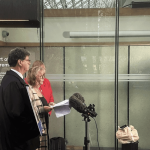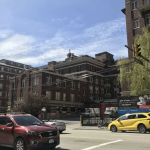Next month’s Synod on Synodality will be aimed at “being opened toward many voices,” Vancouver Archbishop J. Michael Miller said Monday, emphasizing the synodal process “is based on listening to the voice of the Spirit.”
Archbishop Miller was speaking to reporters at a news conference after the first day of the Canadian Conference of Catholic Bishops’ plenary assembly. He discussed preparations for the synod he will attend with three other Canadian bishops and four non-bishop representatives.
The Archbishop said there will be a “great emphasis” on voices within the Church and a focus on discerning what the Holy Spirit is saying. “The Spirit speaks in many ways in the world, and we should be attentive to those voices as well,” Archbishop Miller said.
Following that principle of listening, the archbishop said that unlike previous synods, this one would involve “mostly discussion in small groups, probably language groups” rather than large presentations.
On Monday, the bishops attending the plenary had “a little bit of a trial run as [to] how the synod in Rome should proceed,” Archbishop Miller said. “It was a small taste in our small-group discussions.”
The Synod on Synodality is scheduled to take place in Rome through two assemblies — the first from Oct. 4 to Oct. 28, and a second in October 2024. It will focus on how the Church can be a sign and instrument of union between God and humanity; how to better share gifts and tasks in the service of the Gospel; and what processes, structures, and institutions are needed for a missionary synodal Church.
Synodality, as defined by the Congregation for the Doctrine of the Faith’s International Theological Commission, is “the action of the Spirit in the communion of the Body of Christ and in the missionary journey of the people of God.”
At their meeting Monday, the bishops also discussed humanitarian efforts in Honduras, particularly the work in Guapinol to protect a river that has been severely affected by pollution, negatively impacting the small village’s population of 45,000 people.

“Suddenly their life has become just like a terrible [situation], not being able to use their river, which is the heart of their life,” Carl Hetu, executive director of Development and Peace, said during the news conference.
Hetu said he provided the bishops with the fall action plan to “stop the mining,” which is causing pollution and “to restore the river and restore the [physical and mental] health” of the people. He said the mission is currently gathering signatures and requesting action from the Honduran ambassador to Canada.
The problems in Guapinol are similar to problems in Africa and Asia, where the “protection of the environment [and the] protection of labor and children is no longer respected” when companies are searching for raw materials, said Hetu.
During their meeting this week, the bishops will also address the expansion of euthanasia in Canada and the protection of vulnerable persons, including minors.
The four-day assembly of the Canadian bishops is taking place just outside of Toronto.



